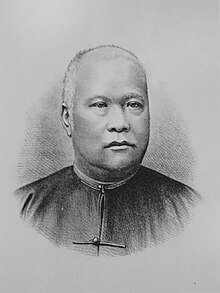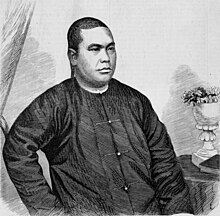
The Eureka Rebellion was a series of events involving gold miners who revolted against the British administration of the colony of Victoria, Australia during the Victorian gold rush. It culminated in the Battle of the Eureka Stockade, which took place on 3 December 1854 at Ballarat between the rebels and the colonial forces of Australia. The fighting left at least 27 dead and many injured, most of the casualties being rebels. There was a preceding period beginning in 1851 of peaceful demonstrations and civil disobedience on the Victorian goldfields. The miners had various grievances, chiefly the cost of mining permits and the officious way the system was enforced.

The Victorian gold rush was a period in the history of Victoria, Australia, approximately between 1851 and the late 1860s. It led to a period of extreme prosperity for the Australian colony, and an influx of population growth and financial capital for Melbourne, which was dubbed "Marvellous Melbourne" as a result of the procurement of wealth.
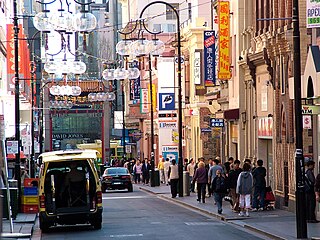
Chinatown is an ethnic enclave in the central business district (CBD) of Melbourne, Victoria, Australia. Centred at the eastern end of Little Bourke Street, it extends between the corners of Swanston and Spring streets, and consists of numerous laneways, alleys and arcades. Established in the 1850s during the Victorian gold rush, it is notable for being the longest continuous ethnic Chinese settlement in the Western World and the oldest Chinatown in the Southern Hemisphere.

Wu Bingjian, trading as "Houqua" and better known in the West as "Howqua" or "Howqua II", was a hong merchant in the Thirteen Factories, head of the E-wo hong and leader of the Canton Cohong. He was once the richest man in the world.
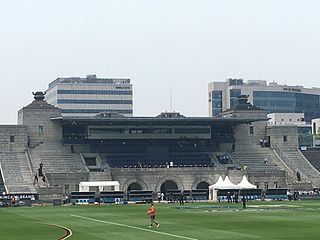
Australian rules football in China has been played since the 1989 and grew in popularity in the 2010s.
William Westgarth was a Scottish-born merchant, historian, statistician and politician in Australia. Westgarth was a member of the New South Wales Legislative Council, and, later, the Victorian Legislative Council.

The Commercial Bank of Australia Limited (CBA) was an Australian and New Zealand retail bank which operated from 1866 until being amalgamated with the Bank of New South Wales, that was established in 1817, to form the Westpac Banking Corporation in 1982.

John Gratton Wilson was an Australian politician. He was a member of the Victorian Legislative Assembly for Villiers and Heytesbury from 1902 to 1903 and a Free Trade Party member of the Australian House of Representatives for Corangamite from 1903 to 1910.
The Buckland riot was an anti-Chinese race riot that occurred on 4 July 1857, in the goldfields of the Buckland Valley, Victoria, Australia, near present-day Porepunkah. At the time approximately 2000 Chinese and 700 European migrants were living in the Buckland area.

During the Australian gold rushes, starting in 1851, significant numbers of workers moved from elsewhere in Australia and overseas to where gold had been discovered. Gold had been found several times before, but the colonial government of New South Wales had suppressed the news out of the fear that it would reduce the workforce and destabilise the economy.
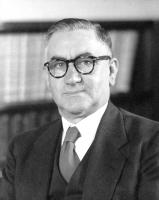
Alfred Ernest Shepherd was an Australian politician. He was an Australian Labor Party member of the Victorian Legislative Assembly for the electorates of Sunshine (1945–1955), Ascot Vale (1955–1958), and Footscray (1958). He was Minister for Education in the 1952-55 John Cain government and was leader of the Labor Party and Leader of the Opposition from 1957 until his death the following year.
Martin Hannah was an Australian politician. He was a member of the Victorian Legislative Assembly from 1902 to 1906 and from 1908 to 1921. He was a member of the Australian Labor Party for most of his career; he was briefly expelled for several months in 1910 and then permanently expelled in 1920 after losing preselection and recontesting as an independent candidate, sitting as an independent for the remainder of his career.
Louis Ah Mouy was a Chinese–Australian community leader and businessman.
The history of Chinese Australians possibly predates the arrival of James Cook in the eighteenth century. Chinese Australians are the oldest continuous immigrant group to Australia after those from the British Isles. Significant Chinese emigration only began in earnest after the discovery of gold and the subsequent gold rushes in Australia. This migration shaped and influenced Australian policies on immigration for over a century. Despite facing societal discrimination and restrictive immigration policies, Australians of Chinese descent have made a substantial contribution to the culture and history of the country.
James Callender Campbell was an Australian politician, member of the Victorian Legislative Council for South Eastern Province from 1895 to 1910.

George Sangster was a Scottish-born Australian politician. He was a member of the Victorian Legislative Assembly from 1894 until his death in 1915, representing the electorate of Port Melbourne for the Australian Labor Party (1894-1902), as an Independent Labor member (1902-1905) and again as an endorsed Labor member (1905-1915).
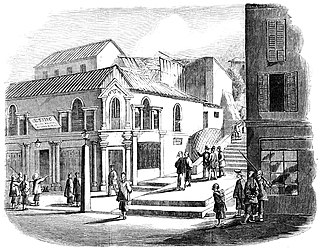
The Esing Bakery incident, also known as the Ah Lum affair, was a food contamination scandal in the early history of British Hong Kong. On 15 January 1857, during the Second Opium War, several hundred European residents were poisoned non-lethally by arsenic, found in bread produced by a Chinese-owned store, the Esing Bakery. The proprietor of the bakery, Cheong Ah-lum, was accused of plotting the poisoning but was acquitted in a trial by jury. Nonetheless, Cheong was successfully sued for damages and was banished from the colony. The true responsibility for the incident and its intention—whether it was an individual act of terrorism, commercial sabotage, a war crime orchestrated by the Qing government, or purely accidental—both remain a matter of debate.

Cheok Hong Cheong, also known as Zhang Zhuoxiong, was a Chinese-born Australian missionary, political activist, writer, and businessman. Originally a Presbyterian elder, he became the superintendent of the Anglican mission in Melbourne. A staunch campaigner against anti-Chinese sentiment in Australia, he co-authored a booklet titled The Chinese Question in Australia (1879) with Lowe Kong Meng and Louis Ah Mouy. He was also opposed to the British opium trade.
Mark Last King was an English-Australian actor and politician.
